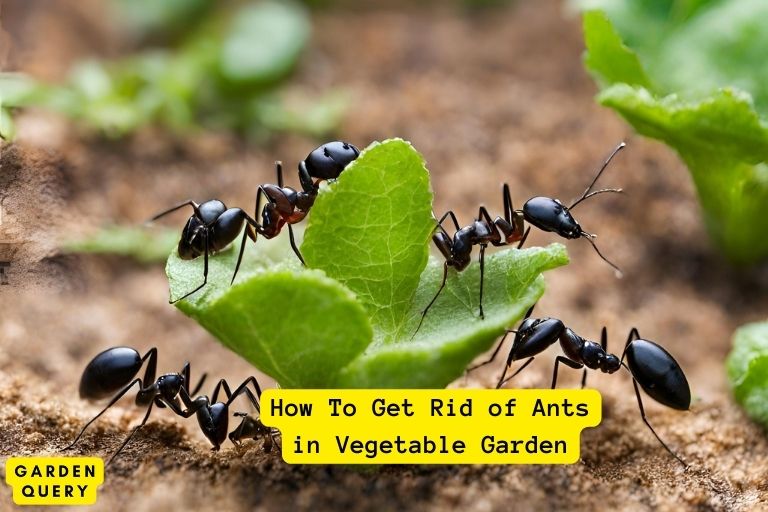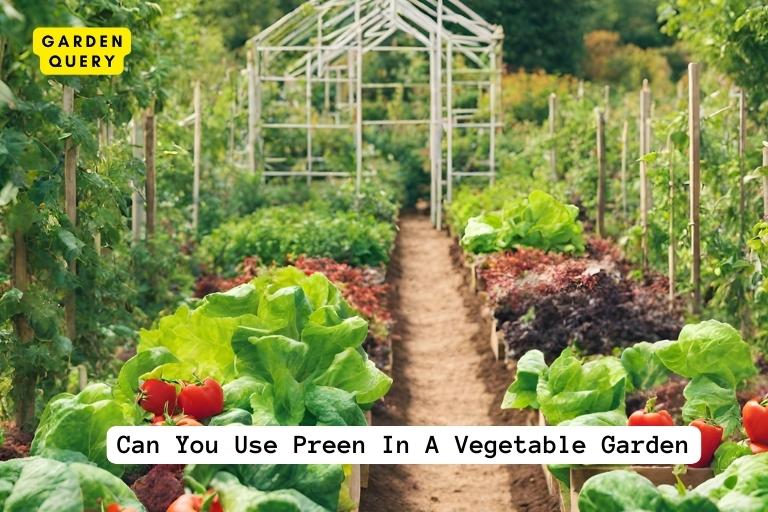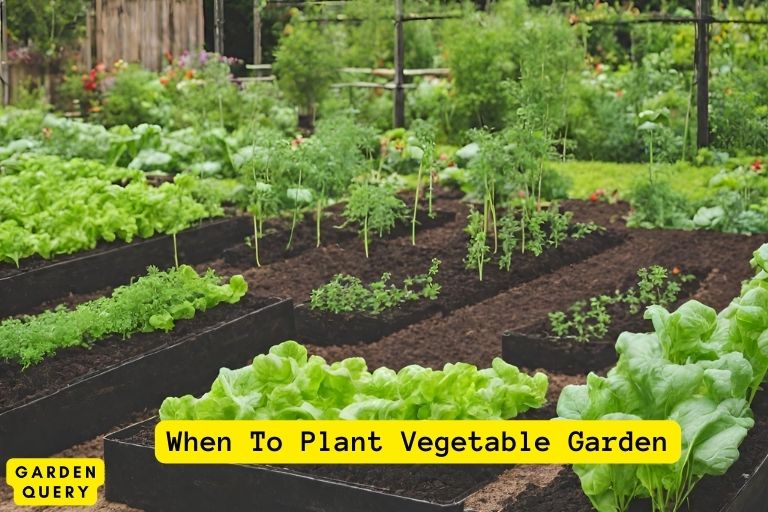How To Get Rid of Ants in Vegetable Garden? Secret Tips!
To get rid of ants in your vegetable garden, you can try several natural and effective methods. These include using diatomaceous earth, cinnamon, vinegar, or creating ant barriers with materials like coffee grounds or citrus peels.
Introduction
Ants are a common sight in gardens, and while they may seem harmless, they can actually cause problems in a vegetable garden. Ants can disrupt the growth of your plants, harvest your vegetables, and even attract other pests. In this article, we will discuss why ants in a vegetable garden are a problem and the importance of getting rid of them.

Why Ants in Vegetable Garden are a Problem
1. Plant Damage: Ants can cause damage to your plants by building their nests near the roots. This can lead to root disturbance and hinder the plant’s ability to absorb nutrients and water from the soil. In severe cases, it can even cause the plant to wither and die.
2. Harvest Loss: Ants are known to be attracted to sweet and sugary substances, including fruits and vegetables. If you have ants in your vegetable garden, they may invade your crops and consume or damage your harvest before you can pick them.
3. Pest Attraction: Ants can attract other pests to your vegetable garden. For example, aphids and scale insects produce a sticky substance called honeydew, which ants feed on. Ants will protect these pests from predators in exchange for the honeydew. Therefore, if you see ants in your garden, it could be an indication of other pest problems as well.
Importance of Getting Rid of Ants in Vegetable Garden
It is crucial to get rid of ants in your vegetable garden to ensure the health and productivity of your plants. Here are a few reasons why it is important:
1. Plant Health: By eliminating ants, you can prevent root disturbance and improve the overall health of your plants. Healthy plants are more resistant to diseases and pests, ensuring a bountiful harvest.
2. Harvest Protection: Getting rid of ants will help protect your fruits and vegetables from being consumed or damaged. This allows you to enjoy the full benefits of your hard work in the garden.
3. Pest Control: By eliminating ants, you can also disrupt the symbiotic relationship between ants and other pests. This reduces the likelihood of other pests infesting your garden and causing further damage.
In conclusion, ants can cause significant problems in a vegetable garden. They can damage plants, consume the harvest, and attract other pests. Therefore, it is important to take steps to get rid of ants in your vegetable garden to protect your plants and ensure a successful growing season.
Natural Remedies for Ant Control in Vegetable Garden
Ants can be a nuisance in your vegetable garden, as they can disrupt the growth of your plants and even attract other pests. However, there are natural remedies that can help you get rid of ants without harming your vegetable plants. Here are some effective methods to control ants in your vegetable garden.
Using Borax and Sugar
1. Borax and Sugar: Mix equal parts borax and sugar in a container. Place the mixture near ant trails or nests in your vegetable garden. The sugar will attract the ants, while the borax will work as a natural insecticide, killing the ants. Make sure to keep this mixture away from children and pets, as borax can be harmful if ingested.
Using Diatomaceous Earth
2. Diatomaceous Earth: Sprinkle food-grade diatomaceous earth around the perimeter of your vegetable garden and along ant trails. Diatomaceous earth is made up of fossilized diatoms and has sharp microscopic edges that can cut through the exoskeleton of ants, causing them to dehydrate and die. It is an effective and safe way to control ants without harming your vegetable plants.
Using Citrus Peels
3. Citrus Peels: Ants are repelled by the strong scent of citrus. Place citrus peels, such as orange or lemon peels, near ant trails or nests in your vegetable garden. The scent will deter the ants and prevent them from approaching your plants. Replace the citrus peels regularly to maintain the scent.
These natural remedies are safer alternatives to chemical insecticides and can effectively control ants in your vegetable garden. However, it’s important to keep in mind that ants play a role in the ecosystem, so it’s best to only target them if they pose a threat to your plants.
Remember to practice good garden hygiene by keeping your vegetable garden clean and free from debris, as this can help reduce ant populations. Regularly inspect your plants for signs of ant activity and take action early to prevent infestations.
In conclusion, using natural remedies such as borax and sugar, diatomaceous earth, and citrus peels can help you get rid of ants in your vegetable garden. These methods are safe for your plants and provide an eco-friendly solution to ant control. By implementing these remedies and practicing good garden hygiene, you can enjoy a thriving vegetable garden free from ants.
Chemical Methods for Ant Control in Vegetable Garden
When it comes to getting rid of ants in your vegetable garden, there are several chemical methods you can consider. These methods can help control ant populations and protect your plants from potential damages caused by ants. Here are two effective chemical methods for ant control in a vegetable garden:
Using Ant Baits
1. Using Ant Baits: Ant baits are an effective method for controlling ant populations in your vegetable garden. Ant baits are typically small containers filled with a combination of sweet substances and insecticide. Ants are attracted to the bait and carry it back to their colony, which helps eliminate the entire ant population. It’s important to place the ant baits near ant trails and areas where you’ve observed high ant activity. This will ensure that the ants find the bait and eliminate the colony. Keep in mind that it may take some time for the bait to take effect, so be patient and give it a few days to work its magic. Remember to always follow the manufacturer’s instructions when using ant baits.
Using Insecticidal Soap
2. Using Insecticidal Soap: Insecticidal soap is another effective method for controlling ants in your vegetable garden. This type of soap is made from fatty acids derived from plants and is safe to use around edible plants. Insecticidal soap works by suffocating and killing ants on contact. It can be sprayed directly on ant trails and the areas where ants are most active. It’s important to thoroughly cover the ants with the soap solution for it to be effective. Repeat the application as needed until the ant population is under control. Remember to read and follow the instructions on the insecticidal soap packaging for proper application.
These chemical methods can be effective in controlling ant populations in your vegetable garden. However, it’s important to note that chemical methods should be used as a last resort and with caution. If possible, try using non-chemical methods first, such as removing food and water sources that attract ants or using natural repellents like diatomaceous earth. It’s important to prioritize the health of your plants and avoid any potential harm from chemicals.
Preventive Measures for Ant Infestation in Vegetable Garden
As a gardener, it can be frustrating to deal with ant infestations in your vegetable garden. Ants not only disrupt the natural ecosystem but can also cause damage to your plants. However, there are several preventive measures you can take to keep ants away from your garden and protect your precious vegetables.
Keeping Garden Clean and Tidy
One of the best ways to prevent ant infestations in your vegetable garden is to keep it clean and tidy. Ants are attracted to food sources, so it’s essential to eliminate any potential food sources that might attract them. Make sure to clean up fallen fruits and vegetables regularly and remove any decaying organic matter, as these can serve as a food source for ants. Additionally, keep your garden free from weeds, as they can provide shelter and hiding places for ants.
Creating Physical Barriers
Another effective preventive measure is to create physical barriers to keep ants out of your vegetable garden. There are several methods you can use to create these barriers, such as:
- Ant-Repellent Plants: Some plants, like mint, lavender, and marigold, have natural ant-repellent properties. By planting these around the perimeter of your vegetable garden, you can deter ants from entering.
- Ant Traps and Baits: Ant traps and baits can be placed strategically around your garden to attract and eliminate ants. These traps contain a substance that is attractive to ants but is toxic to them. Make sure to place the traps away from your vegetables to avoid any contamination.
- Diatomaceous Earth: Diatomaceous earth is a natural substance that is safe for humans and animals but lethal for ants. Sprinkle a layer of diatomaceous earth around your garden’s perimeter and near ant trails to create a physical barrier that ants cannot cross.
- Cinnamon: Ants dislike the scent of cinnamon, so sprinkling powdered cinnamon around your vegetable garden can deter them.
By implementing these preventive measures, you can significantly reduce the risk of ant infestations in your vegetable garden. Remember to stay vigilant and take prompt action if you notice any signs of ant activity. With a little effort and proactive measures, you can enjoy a healthy and thriving vegetable garden, free from ant infestations.
Organic Pest Control Methods for Ants in Vegetable Garden
Dealing with ants in your vegetable garden can be frustrating, but there are several organic pest control methods you can use to get rid of them. Here are two effective methods that can help you eliminate ants from your garden without using harmful chemicals.
1. Using Companion Planting
Companion planting is a natural pest control method that involves planting certain plants near one another to repel pests. Some plants have natural substances that ants find repugnant, which can help deter them from your vegetable garden.
For example, you can plant mint, tansy, or pennyroyal around your vegetable plants, as ants tend to avoid these plants. Another effective companion plant to deter ants is marigold, which releases a scent that repels many insects, including ants.
Additionally, you can also plant herbs like basil, thyme, and rosemary, which not only repel ants but also add a wonderful flavor to your meals.
2. Using Nematodes
Nematodes are microscopic organisms that can be applied to your garden soil to control ant populations. Beneficial nematodes, specifically Steinernema feltiae or Heterorhabditis bacteriophora, are known to target and kill ants.
These nematodes enter the ant’s body through natural openings and release bacteria that eventually kill the ant. They are harmless to plants, humans, and beneficial insects, making them an excellent choice for organic pest control.
To apply nematodes, mix them with water according to the instructions on the packaging and apply the solution to your garden soil. It is best to apply nematodes in the evening or on a cloudy day, as they are sensitive to UV light.
Remember to follow the instructions carefully, as the effectiveness of nematodes depends on proper application and environmental conditions.
Both companion planting and nematodes are organic methods to control ants in your vegetable garden. Alongside these methods, it’s important to maintain good garden hygiene by removing any debris or fallen fruits that may attract ants. Regularly check your garden for ant nests and destroy them to prevent further infestations.
By using these organic pest control methods, you can effectively get rid of ants in your vegetable garden and protect your crops without relying on harmful chemicals.
Remember that it may take some time to see the full effects of these methods. It’s essential to be patient and consistent with your pest control efforts to achieve long-term success.
Professional Pest Control Services for Ants in Vegetable Garden
When to Seek Professional Help
Dealing with an ant infestation in your vegetable garden can be a frustrating and challenging problem to solve. While there are many DIY methods available for getting rid of ants, sometimes it becomes necessary to seek professional help. Here are a few instances where it’s best to call in the experts:
1. Severe Infestation: If you’ve tried several DIY methods and the ant infestation in your vegetable garden continues to persist or worsen, it’s time to consider professional pest control services. They have the knowledge and experience to handle severe infestations and will have access to stronger and more effective treatments.
2. Ant Species Control: Different ant species require different treatment methods. Some ant species may be more aggressive or harder to eliminate than others. Professional pest control services will be able to identify the species of ants in your vegetable garden and provide targeted treatments to effectively control and eliminate them.
3. Eco-Friendly Solutions: If you prefer to use eco-friendly methods to control ants in your vegetable garden, professional pest control services can offer environmentally friendly options. They have access to more eco-friendly products and techniques that can effectively eliminate ants without harming your vegetables or the surrounding environment.
Tips for Choosing a Pest Control Service
When selecting a professional pest control service to help get rid of ants in your vegetable garden, here are a few tips to keep in mind:
1. Experience and Expertise: Look for a pest control service that has experience and expertise in dealing with ant infestations specifically in vegetable gardens. They should be knowledgeable about the different ant species and have a range of effective treatment options.
2. Reputation and Reviews: Research the reputation of the pest control service you are considering. Check online reviews and ask for recommendations from friends or neighbors. Reading about others’ experiences can help you make an informed decision.
3. Licensing and Certification: Ensure that the pest control service you choose is properly licensed and certified. This ensures that they meet industry standards and regulations and have undergone necessary training.
4. Guarantees and Warranties: Inquire about any guarantees or warranties offered by the pest control service. A reputable company should stand behind their work and offer a satisfaction guarantee.
5. Eco-Friendly Options: If using eco-friendly methods is important to you, inquire about the pest control service’s eco-friendly options. Ask about the products they use and if they have any organic or natural alternatives available.
By following these tips, you can find a professional pest control service that will effectively eliminate ants from your vegetable garden, allowing your plants to thrive.
Remember, prevention is key when it comes to ants in your vegetable garden. Keeping your garden clean, regularly removing debris, and practicing good hygiene can help prevent ant infestations.
Conclusion
Summary of Ant Control Methods for Vegetable Garden
In conclusion, when dealing with ants in your vegetable garden, it’s crucial to take prompt action to prevent damage to your plants and produce. Here is a summary of the ant control methods discussed in this article:
- Physical Barriers: Create barriers around your garden using substances like diatomaceous earth, cinnamon, or coffee grounds to deter ants from reaching your plants.
- Ant Bait: Use ant bait stations or homemade bait traps to attract and eliminate ants. These baits contain insecticides that the ants carry back to their colony, effectively destroying the entire colony.
- Natural Remedies: Employ natural remedies such as vinegar, lemon juice, pepper, or essential oils to repel ants from your garden. These methods are safe for plants and the environment.
- Keep the Garden Clean: Regularly remove fallen fruits, vegetables, and debris from your garden, as they can attract ants. Clean up spills or food sources that may entice them.
- Diagnose and Treat Plant Problems: Monitor your plants for signs of aphids or other pest infestations, as ants are often attracted to the honeydew these insects produce. Treat any pest issues promptly to deter ants.
Maintaining a Healthy and Ant-Free Vegetable Garden
To maintain a healthy and ant-free vegetable garden, it’s essential to practice good garden hygiene and preventive measures. Here are some additional tips:
- Rotate Crops: Avoid planting the same vegetables in the same location year after year. Crop rotation helps disrupt pest and disease cycles, reducing the likelihood of ant infestations.
- Use Companion Planting: Planting aromatic plants like mint, basil, or marigold can help repel ants and other pests from your vegetable garden.
- Inspect Seedlings: Before introducing new plants or seedlings into your garden, carefully examine them for any signs of ant colonies or other pest activity.
- Regularly Inspect Garden: Regularly inspect your garden for any signs of ant trails or nests. Early detection will allow for prompt action to prevent ant populations from becoming established.
By implementing these control methods and maintaining good garden practices, you can effectively rid your vegetable garden of ants and enjoy a thriving and healthy crop. Remember, if the ant problem persists or becomes overwhelming, consulting with a pest control professional may be necessary
- Best Therapists In Dallas - February 1, 2024
- Holly Willoughby Husband: Holly Willoughby’s Love Story - January 30, 2024
- Holly Willoughby Dress: 5 Style Secrets and 7 Must-Know Career Milestones - January 30, 2024





